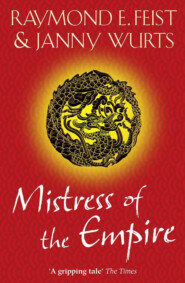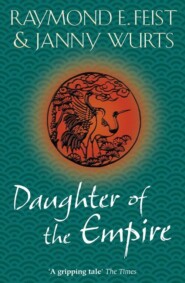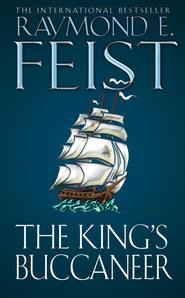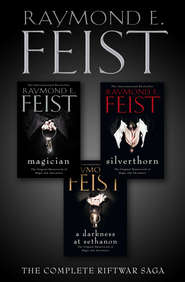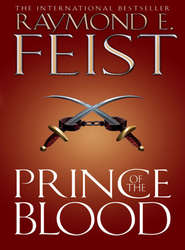По всем вопросам обращайтесь на: info@litportal.ru
(©) 2003-2024.
✖
The Complete Conclave of Shadows Trilogy: Talon of the Silver Hawk, King of Foxes, Exile’s Return
Автор
Год написания книги
2018
Настройки чтения
Размер шрифта
Высота строк
Поля
‘That was all?’
‘Yes, sir.’
Kendrick smiled. ‘Leo thinks it amusing to toss a boy into service without much preparation. I shall have to have words with him again. You did well enough, and none of the guests realized you were not experienced.’ He turned to Robert. ‘I will leave him to you. Good night.’
Robert rose and nodded in farewell, then motioned for Talon to come sit.
Talon did so and Robert studied him. Finally, he said, ‘Do you know the name of the man who sat at the head of the table?’
Talon said, ‘Yes.’
‘Who is he?’
‘Count Ramon DeBarges.’
‘How do you know that?’
‘I saw him, the last time he visited the inn. Lela told me his name.’
‘How many rings did he wear on his left hand?’
Talon was surprised by the question, but said nothing as he tried to remember. After calling up an image of the count holding his wine goblet for more wine, he answered, ‘Three. A large red stone in a silver setting upon his smallest finger. A carved gold ring upon his next finger, and a gold ring with two green stones upon his pointing finger.’
‘Good,’ said Robert. ‘The green stones are emeralds. The red stone is a ruby.’
Talon wondered what the purpose of these questions was, but said nothing.
‘How many emeralds in the necklace worn by the lady to the Count’s left?’
Talon paused, then said, ‘Seven, I think.’
‘You think or you know?’
Talon hesitated, then said, ‘I think.’
‘Nine.’ Robert studied the young man’s face, as if expecting him to say something, but Talon remained silent. After a long pause, he asked, ‘Do you remember what the Count and the man two places down on his right were speaking of when you were serving ale to the lady between them?’
Talon remained quiet for a minute as he searched his memory. ‘Something about dogs, I think.’
‘Think or know?’
‘Know,’ said Talon. ‘They were speaking of dogs.’
‘What about dogs?’
‘Something about hunting dogs.’ He paused, then added, ‘I still do not speak the Roldemish tongue well, Robert.’
De Lyis was motionless for a few seconds, then nodded. ‘Fair enough.’ Next, he launched into a series of questions, ranging from who ate what, what was discussed at various times, what manner of clothing and accessories the ladies wore, and how many drinks each man consumed, until it seemed to Talon he would be there all night.
Suddenly, Robert said, ‘That’s all. Return to the barn and sleep there until you are called. Then you will be moving into the servants’ quarters here; you will share a room with Gibbs and Lars.’
‘Am I then to be a servant in Kendrick’s household?’
Robert smiled slightly. ‘For a time, young Talon. For a time.’
Talon rose and made his way through the kitchen, where loaves were rising before the hearth, waiting to be baked first thing in the morning. Realizing he had not eaten for hours, Talon paused to snatch an apple from a large bowl and bit into it. He thought they were to be used for pies, but was content that the loss of one would be no great hardship to Leo.
Making his way outside, he saw that the eastern sky was lightening. Soon it would be the time before dawn his people knew as the Wolf’s Tail, that grey-upon-grey time in which a man can steal an early march upon the hunt or a long journey, before the dawn breaks.
Entering the barn and seeking out his pallet, Talon threw himself down, fatigue overwhelming him. The half-eaten apple fell from his hand. As he wondered what fate had in store for him and the reason behind Robert’s many and seemingly pointless questions, Talon fell quickly into an exhausted sleep.
• CHAPTER FOUR • (#ulink_17618cf6-fd1b-5cd6-bf15-5fc1011d846b)
Games (#ulink_17618cf6-fd1b-5cd6-bf15-5fc1011d846b)
TALON FROWNED.
He looked at the cards laid out upon the table and attempted to discern any choice that might create a solution. After examining the four cards he had just turned over, he realized there was no possible way he could continue the game.
Sighing, half in frustration, half out of boredom, he swept up the cards and began reshuffling them. He resisted the temptation to turn and see if the two men watching him were showing any reaction.
The white-haired man he had thought of as ‘Snowcap’, but who was actually named Magnus, stood beside Robert, who was sitting on a stool, brought into the dining room from the common room. Robert had introduced the concept of cards to Talon a week earlier.
The deck consisted of fifty-two cards, in four suits: cups, wands, swords and diamonds, each a different colour, the cups being blue, wands green, swords black, and diamonds yellow. They were used primarily for games likel-in-land, pashawa, and poker, or po-kir as it was called in Kesh. Robert had demonstrated several games and had Talon play a few hands of each to get familiar with the ordering of the suits, from the card known as the ‘ace’, which Robert explained came from a Bas-Tyran word for ‘unit’, to the lord. The lower cards were numbered from two to ten, but Talon saw no logic as to why the unit, or the one as he thought of it, was the most valuable card, more so than the lord, lady, or captain.
Talon smiled slightly to himself. He didn’t know why that little fact, that the lowest number, the single unit, was the most valuable card, irritated him. Still, he did well enough with the games Robert had taught him. Then Robert had introduced him to the concept of solitary play, using the deck for idle amusement when lacking opposing players. The games were roughly a variation on a theme, different ‘layouts’, as Robert called them, with different ways in which to draw cards from the deck. Some games required the player to build cards in rows based on rank, in alternating colours of light and dark, or in order of number, or a combination.
Earlier in the previous day Robert had taken Talon from the kitchen – there were no guests so duty was light – and had brought him into the dining hall. There he had introduced the game of ‘four lord’s.
It was a perplexing game. Four lords were laid out from right to left, and four cards were dealt face up. The object of the game was to place the cards by suit next to the lords, the only prohibition being that cards must be placed next to cards of the same number or suit. The next goal was to create ‘packs’ of four identical number cards, in a square. This continued until all four aces were together, at which point they were retired from the game. Then the twos, and so fourth until only the lords remained.
Talon had discovered early on that it was a very difficult game to win, relying far too much on the random luck of cards coming out in a certain order, rather than skill. But some skill was required in anticipating situations in which cards would be isolated from others of like value.
For half a day Talon had eagerly played the game, determined to become a master at it. Then he realized just how much random luck was involved and became disenchanted with it. Yet Robert still insisted that he play, and sat behind silently to observe.
As Talon laid out the next game, he wondered not for the first time exactly why Robert was doing this.
Magnus whispered, ‘Robert, why are you doing this?’
Robert whispered, ‘The boy’s people have little abstract logic in their daily lives. They were hunters, farmers, poets and warriors, but their mathematics were basic and all the disciplines based upon advanced logic were lacking to them. They had builders, yes, but no engineers and far fewer magic-users than any other people I’m aware of, perhaps one or two throughout the entire land of the Orosini.’
They spoke in the King’s Tongue, the language of the Kingdom of the Isles, to prevent Talon from understanding them – and Robert judged his hearing very sharp.
‘So the games are to teach him logic?’
Robert nodded. ‘They are a start. This is very basic problem-solving.’
Magnus’s pale blue eyes were fixed upon the cards on the table. ‘I’ve played four lords, Robert. You taught it to me, remember? It is a difficult game. He won’t win many.’






